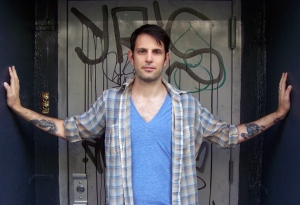The Brooklyn Commune’s Cultural Democracy and Representation Team, led by Kyoung H. Park, has designed an artist survey to invite artists to share their experiences working in the field in order to open up public discussions regarding diversity and inclusion in the performing arts. Over the course of the next few months, we will highlight interviews with artists who are in conversation with the Brooklyn Commune’s Cultural Democracy and Representation Team, and we invite members of our community to help us gather more information by completing our survey here. Our team will synthesize our findings and share these interviews and our findings online.
1- How do you identify yourself? How does your identity influence or inform your work?
I identify in two ways. First, I identify as queer. I’m interested in gender, in sex, in the body, in issues of fairness. Secondly, I identify as a working class playwright. I have no pedigree, I’m self-taught, and I spend a lot of time trying to get people in the industry to engage in issues of class. Everybody in theater is eager to discuss gender, sexual orientation, race etc. (even if they won’t actually change anything) but they absolutely will not discuss class disparity.
2- Do you face challenges in the field based on the way you identify yourself?
I feel less like my problems come from how I identify than from actually being that thing. I’m a playwright, and the entire industry is set up so that playwrights who come from financial privilege succeed and no one else really gets a shot. Even when minority playwrights (women, people of color, etc.) are embraced and promoted by the field, they are almost always from financially privileged backgrounds.
3- Where do you (or can you) locate representations of your culture [community] within contemporary performance?
There is a lot of theater by and for queer people so I feel covered there, although none of it is very mainstream. Dixon Place, and the like. But at least it exists! I see almost no plays by or about working class communities. Since most plays are by rich playwrights and performed for wealthy audiences, they tend to be about rich people on vacation etc. It’s a cycle of exclusion.
4- Are there moments in which your cultural identity [community] is misrepresented or underrepresented, and how do you address this?
I would say that when I do see gay characters in theater they are nearly always white and they are nearly always urban and wealthy. Working class people, again, are entirely unrepresented in the American mainstream theater.
5- Have you been a working artist in another culture [community]? Has this experience exposed something about current practices that we can learn from?
The first play I ever saw that looked like my childhood was British. It was Jez Butterworth’s Jerusalem. How is it that a British play, a country I’d never even visited at the time of seeing it, came closer to my experience than any American play I’d ever seen. Something is wrong there.
I’ve worked in London and in Australia. Both are able to do more adventurous work than the U.S. because of government funding, although London still doesn’t have as much queer work at us and seems to favor naturalism over experimentation. Australians seem to like wildness in a play, which I appreciate.
I think a major problem we have in the States is that baby boomers have held onto power since the 60’s and haven’t let go so the status quo taste hasn’t swapped hands in too long. Too many theaters say they want a younger audience, but they program the same dusty play and just use a hipper font on the poster.
Because of old people taste, most of the successful young playwrights are those that write, intentionally or not, for old people.
Other countries aren’t saddled with out MFA problem either, MFAs being one of the main mechanisms by which wealthy kids become the more successful playwrights.
6- Have you worked in other cities/regions and can you tell us about the reception of your work there in comparison to NYC?
Oops. See above. I’ve also worked extensively in Chicago, Seattle, Austin and Berkeley, all of which have smaller, younger, more adventurous theater than New York seems to, even though they’re often just importing New York plays. This seems paradoxical, but it isn’t. They’re bringing in the cooler NY plays while promoting their own.
7- Describe an ideal situation in which your work is presented. Is there anything you’d like your audience to know about you before viewing your work?
When I attend an institutional theater, I feel excluded. Let’s be honest: I’m not the intended audience. The ideal place for my work is fun, casual, and unpretentious. The audience is younger, adventurous, a mix in terms of race and sexual orientation. And they paid less than $20 for their ticket.

Mr. Conkel seems to think that he problems with theater today are wealth and age. I was once young and poor like Mr. Conkel. I am now old and rich. I have to say that wealth and age have improved my artistic sensibilty tremendously. One day, God willing, Mr. Conkel will grow old and rich, and he will regret his youthful thinking like he will regret his tatoos.
Posted by RG | July 14, 2013, 12:01 pm